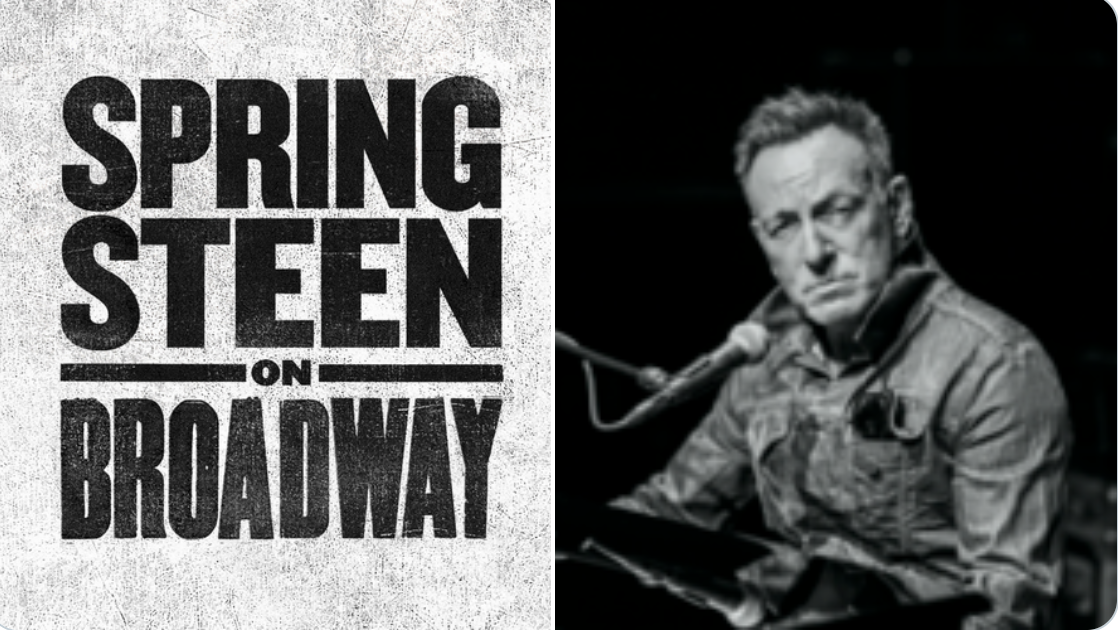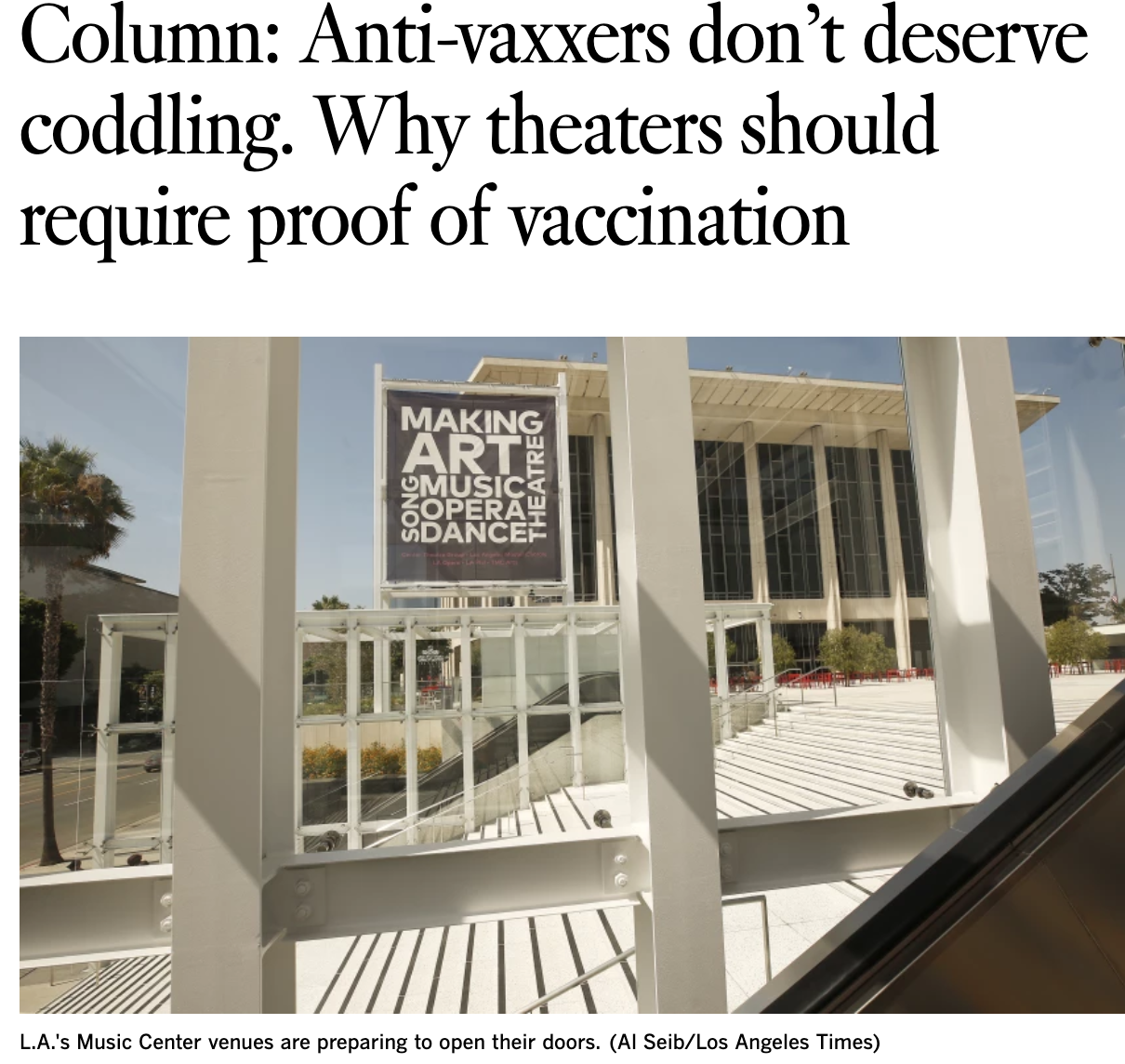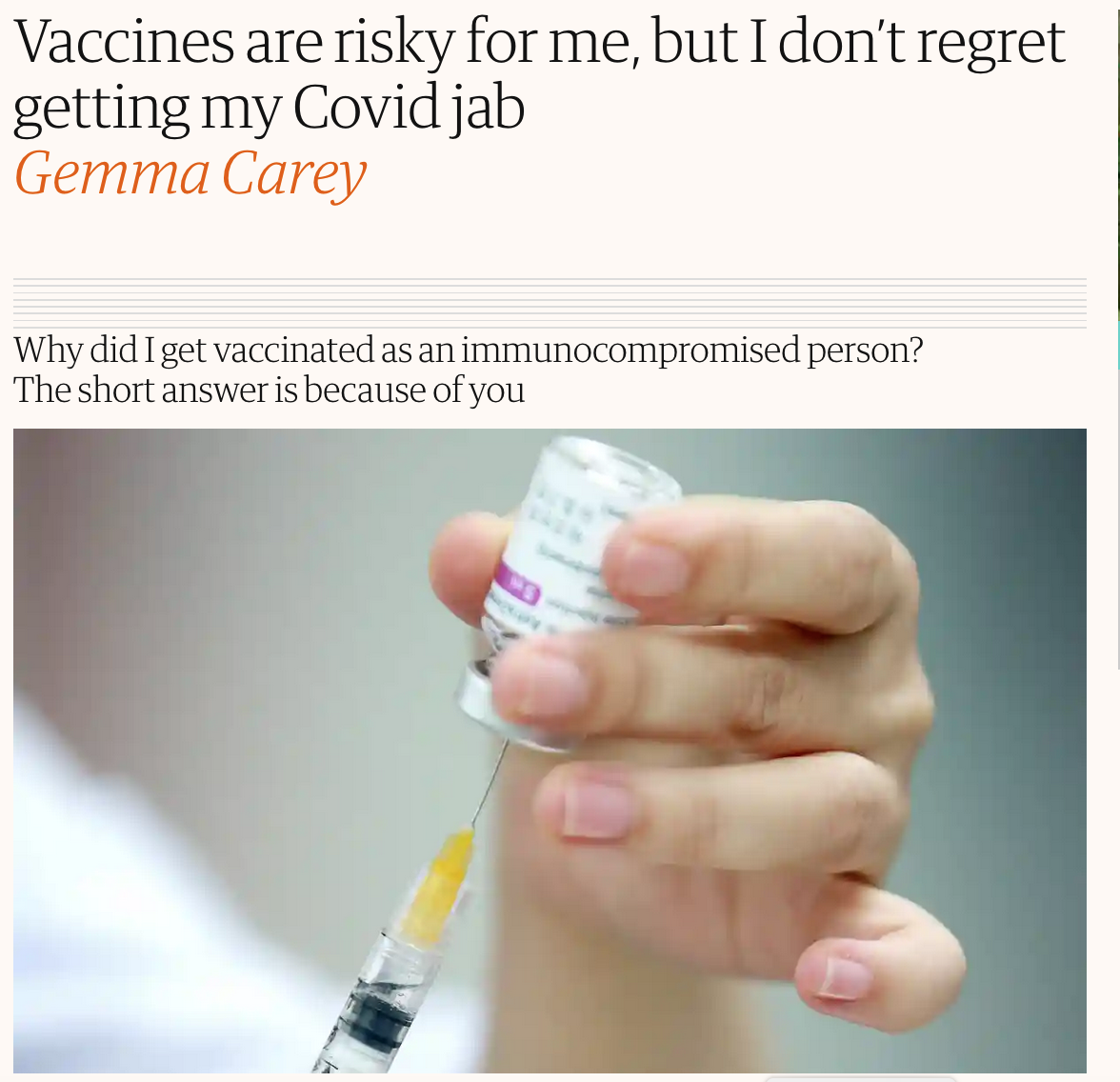Andrew Lloyd Webber insists that theatres open at full capacity on June 21. Maybe he should insist that audience members are fully vaccinated, too.
It was announced this week by UEFA that vaccine passports will be used at Wembley as one of the ways to allow supporters to attend matches at Euro 2020. According o a report on Sky News (https://news.sky.com/story/covid-vaccine-passports-to-be-used-at-wembley-for-euro-2020-matches-12328009), “fans will be required to show proof of full vaccination against coronavirus or a negative lateral flow Covid-19 test within the previous 48 hours before being admitted into the stadium, which is due to host all three of England’s group games this month.” These include the opening match against Croatia on June 13, another against Scotland on June 18 and and one more on June 22. The events are also being capped at 25% of capacity — 22,500.

And in the announcement on Monday that Bruce Springsteen is to play a return Broadway engagement this summer at the St James Theatre, starting from June 26, it was revealed that “audience members will be required to provide proof of full COVID-19 vaccination in order to enter the theatre.”
After the headlines yesterday that I wrote about here about Andrew Lloyd Webber threatening to defy the government and open his new musical Cinderella at full capacity, even if stage four of the roadmap out of lockdown is delayed from June 21 and social distancing restrictions are not lifted then, perhaps an alternative would be for him to get behind vaccine passports instead. He did, after all, participate in trials for the Covid vaccine, and was quick to champion it (even though there was no certainty that he didn’t receive a placebo and not the real thing).
There is, of course, a libertarian wing — and its not just in the Conservative party, alas — that would see such a requirement a serious infringement on civil liberties, and an individual’s right to go about in society unimpeded. But there is also a duty not to impose a danger to others as you do so, and Vaccine refuseniks put us all at risk. And besides, there is no RIGHT to go to see any show; your presence there is always at the discretion of the management, who can impose their own restrictions and requirements within the law (so, for example, they cannot exclude people on the grounds of race, disability or gender).
But requiring proof of a Covid vaccine isn’t, as far as I can see, a breach on those grounds. It is simply a recognition that we all have a stake — and a duty — in this.

As Charles McNulty, theatre critic of the LA Times, put it in a recent column,
“For a good percentage of those millions of Americans still resistant to getting a COVID-19 vaccine, no amount of information will make a difference. Grumble as we might at this recalcitrant stance, bodily autonomy ought to be a basic human right.
So to all the holdouts out there, enjoy your God-given freedom! But in this next phase of reopening, I hope you won’t mind steering clear of crowded concert halls and busy theaters while the rest of us take steps to feel safe gathering again as an audience… If universities, such as Yale, Stanford and UCLA, are planning to require returning students to be fully vaccinated, why can’t performing arts venues do the same? This policy would offer audience members some insurance that the stranger crammed into the seat next to them wasn’t a potential petri dish of COVID variants eagerly seeking a crack in their newly erected wall of immunity.”
And there’s the rub (or at least the rubbing of tightly packed shoulders): we are, of necessity, crammed into theatre seats, which per necessity to maximise the potential returns on the audience filling that limited space, have got smaller and tighter.
As McNulty goes on to say,
“Sorry for not contorting myself to understand the sincere place from which the wide-ranging resistance of anti-vaxxers emanates. But I see no reason why those of us who have driven to a pharmacy in Calabasas in tight pants and out-of-control hair must continue to indulge their selfishness. Do they really think any of us were gung-ho about getting a shot that could leave us bedridden for 36 hours? We were signing up not as pharmaceutical industry dupes but as Americans determined to do our part in turning the tide against this once-in-a-century pandemic. If they’re going to ride our vaccinated coattails, they can at least play by our rules. As walking targets for COVID-19, they have more to lose than we do. But it’s tiring to care about those who are content to roll the dice not just for themselves but for those they inadvertently breathe on.”
He does allow that for a few, vaccinations are not available:
“It’s not fair to lump all the unvaccinated into a single category, and for those with a health condition making them ineligible for a shot, a reasonable accommodation should be found. Perhaps a balcony could be cordoned off for this small mask-wearing group or select performances could be streamed not just for them but for anyone who might benefit from a reprieve from the conspiracy rabbit hole.”
Interestingly, Australian academic Gemma Carey wrote a piece for The Guardian on Monday, about having had her vaccine, despite having suffered from a rare autoimmune disease which shred her nervous system. She had a first dose of the AstraZeneca vaccine nonetheless: “Twenty-four hours later, I was in ambulance.”

She describes the dilemma she faced:
“Covid has presented me, and people like me who have autoimmune disease, with a serious conundrum. We are more likely to die from the virus, and if we don’t, we’re at heightened risk of becoming one of the seriously debilitated Covid “long haulers”. But it’s not so simple as getting vaccinated.
I’m not meant to have an annual flu vaccine, let alone a brand-new type of vaccines. People like me can’t know how any of the Covid vaccines will affect us – the data simply isn’t there yet.”
But she went ahead regardless:
“Why did I get vaccinated as someone for whom vaccines are risky? The short answer is because of vaccine hesitancy. Well, more accurately, because of you – and the government’s poor rollout, and my desire to live a normal life.”
She is writing from Australia, where only 1.9% of the Australian population is as yet fully vaccinated. Fewer than 50% of over 50s are willing to get AstraZeneca for fear of blood clots.
As she points out,
“Blood clots are scary, I understand this. I also had to weigh up the risk of blood clots when I chose AstraZeneca. Yet the risks are low. And we now know how to detect the disorder through checking for platelet counts, and how to treat it. /Every drug you take has risks. Most of them are far greater than AstraZeneca. That anti-inflammatory you pop when you’ve got an injury – 30-50% higher risk you’ll have a cardiac arrest according to a study, depending on the brand and how much you take. The contraceptive pill carries a risk of blood clots in a range of around 1 per 2,500 people. Plain old paracetamol is the leading cause of acute liver failure in the western world.”
And if you want to see Bruce Springsteen on Broadway, maybe you need to make those around you as safe as possible.
I’ve had both my vaccine doses now, but though I’m reassured, the protection is not 100% — especially with the variants, whose effects are not yet fully understood. I will not feel safe siting amongst thousands of other people whose vaccine status I have no idea about. The sooner theatres follow the Wembley sporting protocols above the better. Then, and only then, is a return to full capacity a viable option.

